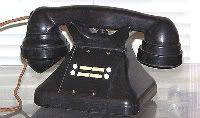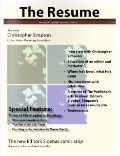• Adventures in Advertising: This Is a Recording
I should come clean and admit that this post is appearing in both Ad Nauseam and Editor's Sidebar since it deals with both advertising and editing.
Hey, why waste a good post?

Many years ago, I worked at a small start-up magazine. The owner and publisher, Peter, was adamant about the need for advertisers if we wanted to grow our business.
Of course, back then we didn't actually say, "grow our business." We might "increase our business," or our business might grow. But the idea of "growing" a business hadn't made its way into the vernacular yet. However, if it had, Peter would have said it. I've never liked the expression, although I'm hard pressed to explain why. You "grow" corn. You "grow" turnips. But damn it, you don’t "grow the farm." Likewise, your children "grow," but you don't "grow your children."
I'm not sure what the difference is, but it still sounds wrong to me.
It's kind of like prepositions. If I said, "I'm going to Montreal on a bus," you wouldn't think anything of it. Well, you might think, "That's a hell of a long bus ride," but that's about all. You might think, "Why is he going to Montreal when everything he could ever want is right here in Toronto?" but other than that, it wouldn't seem odd.
Of course, back then we didn't actually say, "grow our business." We might "increase our business," or our business might grow. But the idea of "growing" a business hadn't made its way into the vernacular yet. However, if it had, Peter would have said it. I've never liked the expression, although I'm hard pressed to explain why. You "grow" corn. You "grow" turnips. But damn it, you don’t "grow the farm." Likewise, your children "grow," but you don't "grow your children."
I'm not sure what the difference is, but it still sounds wrong to me.
It's kind of like prepositions. If I said, "I'm going to Montreal on a bus," you wouldn't think anything of it. Well, you might think, "That's a hell of a long bus ride," but that's about all. You might think, "Why is he going to Montreal when everything he could ever want is right here in Toronto?" but other than that, it wouldn't seem odd.
On the other hand, if I said, "I'm going to Montreal on a car," then you'd think I was going to make the trip strapped to the roof, like some dead grandmother in an urban legend.
Why "on" a bus, but "in" a car? Only the language gods know for sure.
And maybe Noam Chompsky. He knows everything. Or thinks he does.
At any rate, there was no question Peter was right about one thing: without advertisers, we'd go belly-up inside of four months.
Our only disagreement was how to go about getting these advertisers. Peter thought that cold calls were the answer. We'd simply call every business in the area and convince them to place an ad.
My plan was to take the magazine to the businesses most likely to have an interest in it and pitch them.
In the end, we decided that cold-calling was the best way to get Peter off my back.
Our other disagreement revolved around who was going to do the cold-calling.
And maybe Noam Chompsky. He knows everything. Or thinks he does.
At any rate, there was no question Peter was right about one thing: without advertisers, we'd go belly-up inside of four months.
Our only disagreement was how to go about getting these advertisers. Peter thought that cold calls were the answer. We'd simply call every business in the area and convince them to place an ad.
My plan was to take the magazine to the businesses most likely to have an interest in it and pitch them.
In the end, we decided that cold-calling was the best way to get Peter off my back.
Our other disagreement revolved around who was going to do the cold-calling.
Since I was already doing layout, writing, editing, photography, research, and re-wiring the phones to give us two lines without the phone company knowing about it (a task for which I was eminently unsuited and in which I failed to accomplish anything other than discovering first-hand that telephone lines carry much more juice than you might think), I kind of figured maybe someone else could do it. Someone like -- and I was just spinning thoughts off the top of my head -- the receptionist whose job consisted of answering the phone twice a day. On a busy day.
Except during that unfortunate period of time when the phone wasn't working.
To Peter, however, the only person capable of making effective cold calls was me. My protestations that I was already over-worked, and had absolutely no talent in calling people for ads, only served to bring out the positive thinker in him. I was selling myself short, he told me. After all, with absolutely no training, hadn't I rewired the phones to give us two lines without the phone company knowing about it?
Well, no. In fact, we'd had to bring in the phone company to fix the phone -- after telling them that the wiring had been mucked up during renovations.
Naturally, in the end I did the cold-calling.
After several days without a single response, Peter finally figured out what the problem was.
It wasn't that we were calling completely random businesses without regard to their nature or need for magazine advertising.
It wasn't that we were trying to commit them to a sizeable outlay on the basis of nothing more than a voice on the phone (a phone which, on my end at least, had an annoying buzz in the line).
No, the problem was that since the message was being given by a live person, it was bound to have variations in tone and pitch, which threw off the scientific effectiveness of the cold call.
What was needed was consistency. He'd read research about it.
The answer, of course, was a pre-recorded message and automatic dialling system.
Unfortunately, we had no automatic dialling system, having barely escaped with one working phone after the repairman had initially expressed doubts that the wiring could have become screwed up in that particular way from renovations -- especially when there were no signs of renovations having been done in the last 30 years. Nor did we have a means of recording anything by way of the phone itself. Our only recourse was to use a tape recorder. One of us (and by "one of us," of course, I mean me) would record a message, then for each call place the receiver near the recorder and play it back.
What? I'm serious. I'm telling you -- I was there.
Anyhow, Peter wrote out a carefully worded message, and that night I spent a couple of hours reading and re-reading it into the tape recorder. The next morning, when I was sure he was in the office, I got him on the line and played it for him. When it was finished, I asked him what he thought.
He'd hung up.
And right then I learned one of the most important lessons in advertising: If even the client can't sit through the ad, it's probably not going to work.
The other lesson I learned was that without advertising, a magazine can go belly-up in even less than four months.
It only took us three.
Read more...
To Peter, however, the only person capable of making effective cold calls was me. My protestations that I was already over-worked, and had absolutely no talent in calling people for ads, only served to bring out the positive thinker in him. I was selling myself short, he told me. After all, with absolutely no training, hadn't I rewired the phones to give us two lines without the phone company knowing about it?
Well, no. In fact, we'd had to bring in the phone company to fix the phone -- after telling them that the wiring had been mucked up during renovations.
Naturally, in the end I did the cold-calling.
After several days without a single response, Peter finally figured out what the problem was.
It wasn't that we were calling completely random businesses without regard to their nature or need for magazine advertising.
It wasn't that we were trying to commit them to a sizeable outlay on the basis of nothing more than a voice on the phone (a phone which, on my end at least, had an annoying buzz in the line).
No, the problem was that since the message was being given by a live person, it was bound to have variations in tone and pitch, which threw off the scientific effectiveness of the cold call.
What was needed was consistency. He'd read research about it.
The answer, of course, was a pre-recorded message and automatic dialling system.
Unfortunately, we had no automatic dialling system, having barely escaped with one working phone after the repairman had initially expressed doubts that the wiring could have become screwed up in that particular way from renovations -- especially when there were no signs of renovations having been done in the last 30 years. Nor did we have a means of recording anything by way of the phone itself. Our only recourse was to use a tape recorder. One of us (and by "one of us," of course, I mean me) would record a message, then for each call place the receiver near the recorder and play it back.
What? I'm serious. I'm telling you -- I was there.
Anyhow, Peter wrote out a carefully worded message, and that night I spent a couple of hours reading and re-reading it into the tape recorder. The next morning, when I was sure he was in the office, I got him on the line and played it for him. When it was finished, I asked him what he thought.
He'd hung up.
And right then I learned one of the most important lessons in advertising: If even the client can't sit through the ad, it's probably not going to work.
The other lesson I learned was that without advertising, a magazine can go belly-up in even less than four months.
It only took us three.





